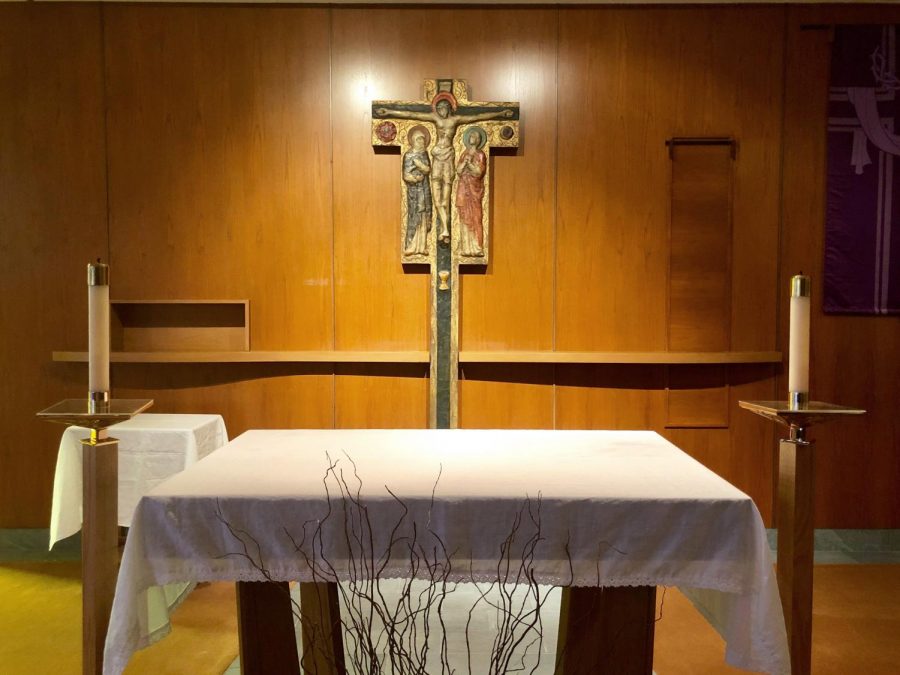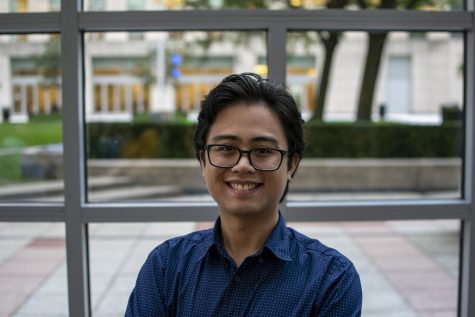How Fordham Serves Its Faith Community
The altar in the chapel on the second floor of Lowenstein. Campus Ministry’s office, the heart of spiritual development at Fordham at Lincoln Center, is also located on the second floor.
May 1, 2019
From Oct. 3 to Oct. 28 of last year, Pope Francis presided over the 2018 Synod on Young People, the Faith and Vocational Discernment, a gathering of bishops, lay theologians and youth delegates from around the world. They discussed many things, chief among them the murky future of young Catholics, many of whom are moving further away from the Church. This manifests itself in a number of ways, from the detachment of reality stemming from an increasingly technological world to the ever-lessening popularity of priestly vocations among the youth to the tragic abuse of minors by those in positions of power, including the Church.
With the aid of the synod, Pope Francis wrote “Christus Vivit,” a papal document addressed specifically to young people, on March 25. In it, he wrote, “The very first words, then, that I would like to say to every young Christian are these: Christ is alive and he wants you to be alive!”
But how well-maintained are Pope Francis’ platitudes on the campuses of Catholic universities? College is supposed to be a time of great change and growth in the lives of those who attend it, so it would stand to reason that the Church would want to be involved in that process.
Fordham, by its very nature, has an irrevocable connection to a specific religious identity. Indeed, Fordham’s Jesuit roots place it in deeper communion with Pope Francis, himself a Jesuit, and the words he puts down on paper. Conor O’Kane, director of Campus Ministry at Fordham Lincoln Center, discussed where Fordham fits into the faith conversation.
“Faith at Fordham, or the development of an interior life, is a constituent element of what it means to be a Fordham student,” O’Kane said. “I think it’s one of the things that makes Fordham distinctive. That’s where its Jesuit and Catholic identity comes to the forefront.”
O’Kane spoke of Fordham’s “robust retreat program” that helps students grow in their faith. “We help them answer some of the deeper questions in their life in the company of the peers,” he said. “We have retreats that focus on their relationship with God … with mentors and guides. I think it’s one of the best things that we do.”
Campus Ministry retreats run throughout the year, including Fresh Vision, a retreat which helps integrate freshmen into the wider campus community, and Emmaus, a more personal offering that promotes self-discovery through Ignatian prayer. “Retreats are steeped in the spiritual exercises of St. Ignatius,” O’Kane said. “It’s led by students who talk about that in the course of their own lives. Students do find [retreats] fruitful.”
O’Kane also described the Catholic Student Fellowship, aimed at members of Fordham’s faith community that meets once a month. “That’s a space where we want to explicitly make a connection between faith and life,” he said.
Liturgical spaces exist at Fordham as well. Everything from Mass services to smaller occasions of interfaith ministry is aided by Campus Ministry.
O’Kane also talked about those who have distanced themselves from the Church and how Fordham can adequately serve their faith lives. “Fordham is a great place to unpack Jesuit values,” he said. “You can encounter that in different ways.” The university imparts these values not only through standard religious practice, but also through volunteer service projects, theology courses, the Fordham University Emerging Leaders program and more.
“You can encounter God and the divine in many different places,” he said. “That’s one of the great graces of Ignatian spirituality: finding God in all things. In a theological sense, we live a sacramental reality. Everything is an opportunity to grow in your relationship to God. That’s the posture we try to grow here.”
O’Kane admitted that, of course, Fordham is not perfect in its promotion of the faith. “It can be a challenge,” he said. “You have to make a compelling case that this is valuable, worthwhile and practical.” This is partly why O’Kane resides in McMahon Hall, in order to adequately serve the community of which he is a part. Invoking Pope Francis, O’Kane summed it up: “The shepherds must smell like the sheep.”
Fordham’s Campus Ministry also speaks with other schools in the Association of Jesuit Colleges and Universities at a semi-annual conference to discuss new methods of serving. O’Kane keeps in close contact with the campus ministries of these schools, comparing notes on their retreats, service work and other programs.
Towards the end of “Christus Vivit,” Pope Francis, had a lot to say about the place of young people in the modern world. “Dear young people,” he writes. “My joyful hope is to see you keep running the race before you, outstripping all those who are slow and fearful.”
Though not everyone sees it, Fordham serves a proud community of faithful Catholics — and, backed by Ignatian spirituality, helps the Church itself evolve.
“When you arrive where we have not yet reached,” writes Pope Francis, “have the patience to wait for us.”













